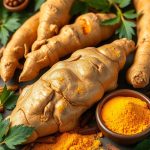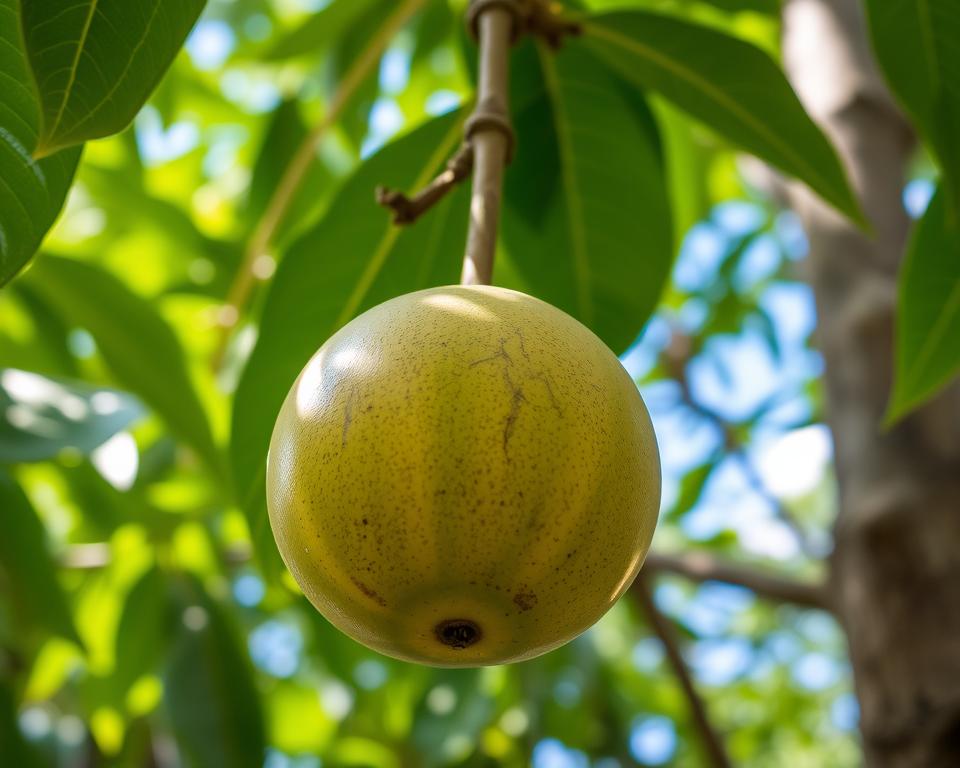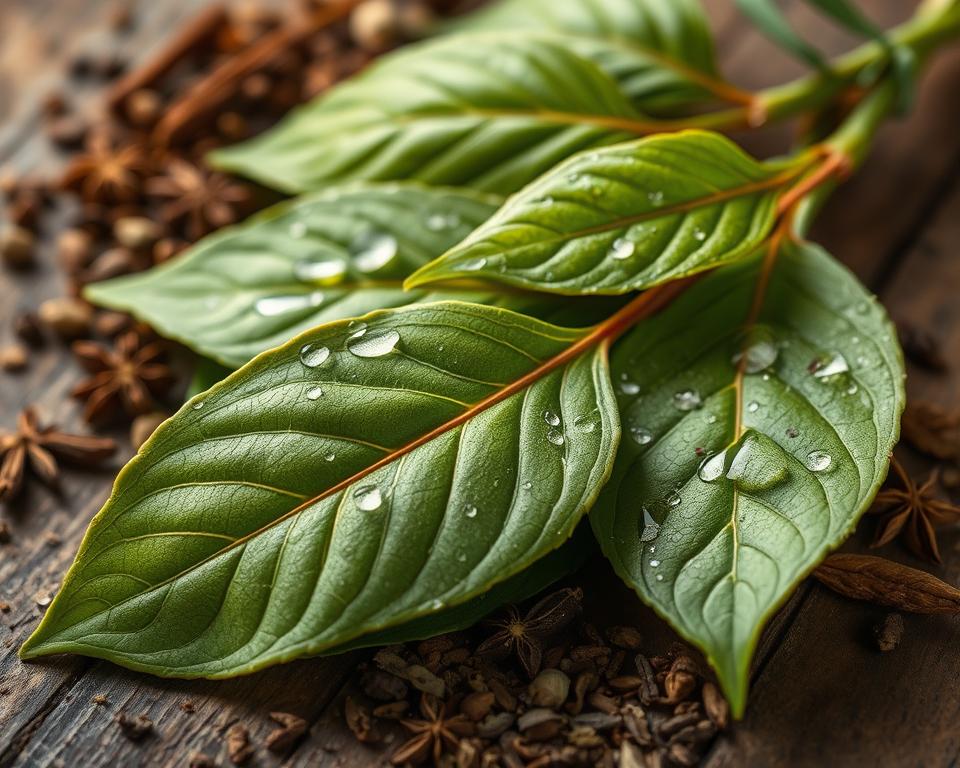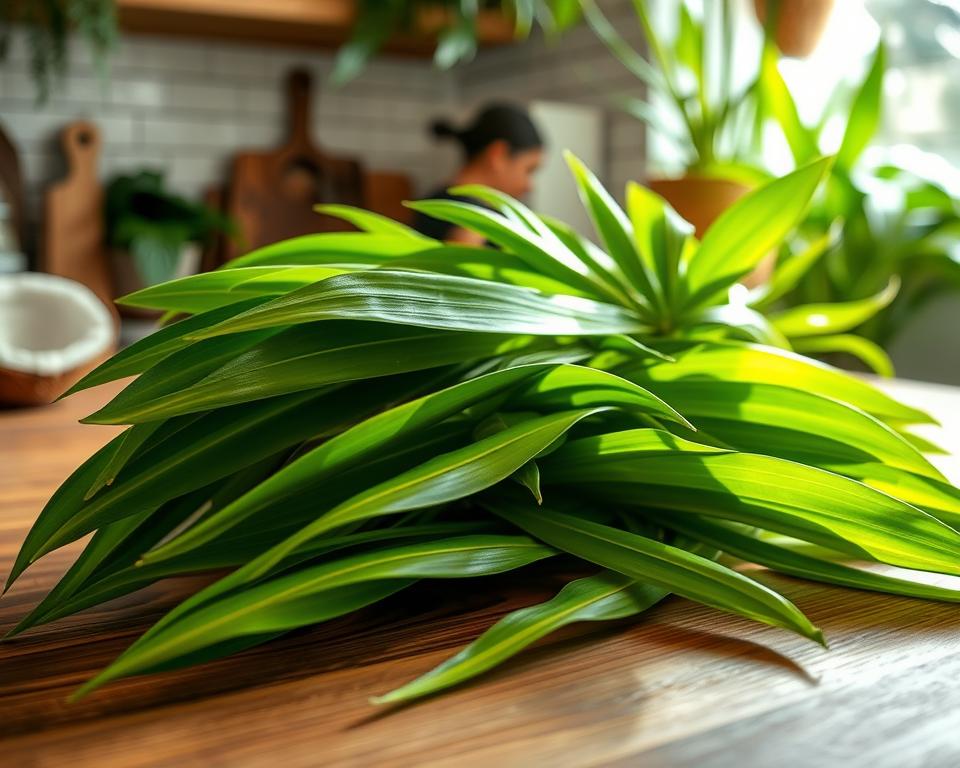Turmeric is a bright golden spice that has been a key ingredient in Indian and Asian cooking for a long time. But it’s not just for cooking; it’s also packed with health benefits. These benefits have made turmeric a popular choice in nutrition and natural remedies. This guide will cover the many uses and benefits of turmeric, including its anti-inflammatory effects and its role in Ayurvedic medicine.
Read interesting things at : tosawakan
Key Takeaways
- Turmeric is a versatile spice with a range of potential health benefits
- Curcumin, the active compound in turmeric, has anti-inflammatory and antioxidant properties
- Turmeric has been used in Ayurvedic medicine for centuries and is now gaining popularity worldwide
- Turmeric can be used in a variety of culinary applications, such as curries and golden milk
- Turmeric supplements may have benefits, but it’s important to consult with a healthcare provider before use
What is Turmeric?
Turmeric is a bright orange-yellow spice. It comes from the Curcuma longa plant’s rhizome, part of the ginger family. This spice has been key in Indian cooking and medicine for ages. It’s loved for its unique taste and health perks.
The Golden Spice of India
Turmeric comes from the Indian subcontinent. It has a rich history in the area’s food and culture. The plant’s rhizome is boiled, dried, and ground into a fine powder. This makes the turmeric spice we all know and use in Indian cooking.
Curcumin: The Active Compound
The secret of turmeric is curcumin, a powerful antioxidant and anti-inflammatory. Curcumin gives turmeric its bright color and many health benefits. Scientists have studied these benefits a lot in recent years.
| Compound | Key Characteristics |
|---|---|
| Turmeric | Vibrant orange-yellow spice derived from the rhizome of the Curcuma longa plant |
| Curcumin | The active compound in turmeric responsible for its color and potential health benefits |
“Turmeric has been used in India for thousands of years as a spice and medicinal herb.”
Turmeric and Its Anti-Inflammatory Properties
Turmeric comes from the Curcuma longa plant and is known for its anti-inflammatory effects. Curcumin, a key compound in turmeric, has caught the eye of scientists.
Studies show that curcumin can stop inflammatory cytokines and enzymes. This makes it a good choice for people with chronic inflammation. Conditions like arthritis, Crohn’s disease, or some cancers can benefit from it.
Turmeric fights inflammation in many ways. Curcumin can:
- Reduce the activity of inflammatory factors like NF-κB
- Stop the production of pro-inflammatory enzymes, such as COX-2
- Lower the levels of inflammatory cytokines, including IL-6 and TNF-α
Curcumin also acts as an antioxidant. It fights free radicals and lowers oxidative stress. This can lessen inflammation.
“Turmeric’s anti-inflammatory properties make it a promising natural alternative for managing a wide range of inflammatory conditions.”
Adding turmeric and curcumin to your diet or supplements can help reduce inflammation. This might lead to better health and well-being.
Antioxidant Benefits of Turmeric
Turmeric is known for its strong antioxidant powers, thanks to curcumin. Curcumin fights off free radicals, which are harmful molecules that can harm cells and lead to diseases. By stopping these free radicals, turmeric protects the body’s cells and boosts health.
Free radicals come from normal cell processes but can be harmful in large amounts. They can damage cells and increase the risk of diseases like cancer and heart disease. Turmeric’s antioxidants help fight these free radicals.
Fighting Free Radicals
Curcumin in turmeric is a strong antioxidant that fights free radicals in many ways. It can neutralize free radicals, stop enzymes that make them, and boost the body’s antioxidant defenses. This helps turmeric protect against oxidative stress and related health issues.
“Turmeric’s antioxidant properties make it a valuable tool in the fight against free radicals, which can damage cells and contribute to chronic diseases.”
Adding turmeric and curcumin to your daily life can help your body fight oxidative stress. You can use it in cooking or as a supplement. Its antioxidants will improve your health and well-being.
Turmeric for Digestive Health
Turmeric is a bright yellow spice known for its unique taste and smell. It’s also being studied for its benefits to the digestive system. The key ingredient in turmeric, curcumin, may help fight inflammation and protect the gut.
Research shows turmeric can ease symptoms of digestive problems like irritable bowel syndrome (IBS) and inflammatory bowel diseases (IBD). It might help by balancing gut bacteria and lowering inflammation. This could make digestion more comfortable and reduce bloating.
Turmeric could be good for your digestive health because it:
- Reduces inflammation in the gut, which helps prevent digestive issues
- Helps balance the good and bad bacteria in the gut
- Boosts digestive enzymes to better break down and absorb nutrients
- Protects the lining of the digestive tract
Even though we need more studies, turmeric might be a tasty way to support your gut health. Adding it to your meals could be a natural way to keep your digestive system healthy.
But, if you have health issues or take certain medicines, talk to a doctor before eating more turmeric. It could affect how your body reacts to some treatments or worsen some health problems.
Potential Benefits for Brain Health
Research shows that turmeric could be good for brain health. It has a compound called curcumin that might lower the risk of Alzheimer’s disease. This spice could be a big help for brain health.
Curcumin is known for its strong anti-inflammatory and antioxidant effects. These help keep the brain working well and protect it from getting worse with age. It fights inflammation and oxidative stress, which are bad for the brain.
Neuroprotective Effects
Studies say curcumin boosts the brain’s ability to change and make new connections. This is key for learning, remembering things, and staying mentally sharp. It also helps grow new brain cells, which is good news for fighting diseases that affect the brain.
Turmeric and curcumin help protect the brain by fighting inflammation and oxidative stress. These actions could help keep the brain working well and might lower the risk of losing cognitive abilities as we age.
| Potential Benefits of Turmeric for Brain Health |
|---|
|
“Turmeric’s active compound, curcumin, has shown promising neuroprotective properties that may benefit brain health and cognitive function.”
Using Turmeric in the Kitchen
Turmeric is more than just a health booster; it’s a kitchen essential. This golden spice is loved for its flavor and color in many dishes. It’s a key spice in Indian cooking and now a favorite worldwide.
Adding Flavor and Color
In Indian cooking, turmeric is a must-have. It adds an earthy, slightly bitter, and peppery taste. This spice makes many dishes look and taste better, thanks to its golden color.
But turmeric isn’t just for Indian food. It’s great in marinades, rubs, and dressings for meats and salads. It also adds a unique flavor to soups, stews, and baked goods.
| Ways to Use Turmeric in Cooking | Examples |
|---|---|
| Curries and Spice Blends | Curry powder, garam masala, tandoori masala |
| Rice and Grains | Turmeric rice, biryani, pilaf |
| Vegetables and Legumes | Roasted vegetables, lentil dishes, bean curries |
| Sauces and Dips | Yogurt-based raita, hummus, turmeric vinaigrette |
| Baked Goods | Turmeric-infused breads, pastries, cookies |
Turmeric is a versatile spice for any kitchen. It’s perfect for making curries, marinating meats, or adding color to baked goods. Using turmeric can make your cooking more exciting and delicious.
Golden Milk: A Turmeric-Infused Beverage
Turmeric, a vibrant golden spice, has won over health lovers around the world. It’s often enjoyed in golden milk, a warm drink that mixes turmeric with creamy milk or a plant-based alternative. This drink is both soothing and nourishing.
Golden milk, also known as turmeric latte or haldi doodh, is popular for its anti-inflammatory and antioxidant benefits. It combines turmeric with spices like ginger, cinnamon, and black pepper. These spices boost the absorption of turmeric’s curcumin, making the drink more effective.
To make golden milk, start by simmering turmeric, milk, and a bit of sweetener like honey or maple syrup. Add spices like ginger and cinnamon for extra flavor and health perks. This drink is warm, comforting, and looks vibrant, perfect for any time of day.
“Golden milk is a soothing and nourishing way to incorporate the health-promoting properties of turmeric into your daily routine.”
Golden milk tastes great and is known for its health benefits. Turmeric contains curcumin, which fights inflammation and acts as an antioxidant. Drinking golden milk can support your immune system, digestion, and brain health.
Looking for a cozy drink or a natural turmeric boost? Golden milk is a tasty and versatile choice. Enjoy its warm, vibrant taste and explore the many benefits of this amazing spice.
- In a small saucepan, mix 1 cup of milk (dairy or plant-based) with 1 teaspoon of ground turmeric.
- Add a bit of ground ginger, cinnamon, and black pepper for flavor and better turmeric absorption.
- Heat the mix, stirring often, until it simmers. Then, reduce the heat and simmer for 5-10 minutes to let the flavors blend.
- Add honey or maple syrup to taste, if you like.
- Pour the golden milk into your favorite mug and enjoy its comforting warmth.
Enjoy the bright colors and soothing taste of this turmeric drink. Discover the health perks of this amazing spice in a tasty way.
Turmeric in Indian Cuisine
Turmeric is a key ingredient in Indian cuisine. It adds flavor, color, and depth to many dishes. It’s used in curries and spice blends like garam masala, giving them a unique taste and color.
Turmeric is very versatile in Indian cooking. It’s a must-have in curries like butter chicken and vindaloo. It’s also in spice blends like curry powder and garam masala, seasoning many foods.
Curries and Spice Blends
Turmeric is famous for its role in making curries. It adds color and depth to the dish. Whether it’s a creamy or spicy curry, turmeric brings all the flavors together.
Turmeric is also key in making spice blends. Garam masala, a blend of warm spices, often includes turmeric. These blends season many foods, adding a rich flavor.
Turmeric’s use in Indian cuisine shows its value and versatility. It adds unique flavor and color to curries and spice blends. This makes it a crucial part of Indian cooking.
Turmeric Supplements: Pros and Cons
Turmeric is known for its bright yellow color and unique taste. It’s also famous for its health benefits. Many people now take turmeric supplements, usually in the form of curcumin extracts. These supplements make it easy to get more turmeric into your diet. But, it’s important to think about the good points and the bad before deciding.
Potential Benefits of Turmeric Supplements
- Anti-inflammatory Properties: Curcumin, found in turmeric, is known for its strong anti-inflammatory effects. This can help with conditions like arthritis, joint pain, and muscle soreness.
- Antioxidant Protection: Turmeric supplements are full of antioxidants. These can fight off harmful free radicals and support your overall health.
- Digestive Support: Turmeric can improve digestion and help with symptoms of irritable bowel syndrome (IBS).
Potential Considerations and Drawbacks
- Interactions with Medications: Turmeric supplements might not mix well with some medicines, like blood thinners, diabetes drugs, and NSAIDs. Always talk to a doctor before starting turmeric supplements.
- Potential Side Effects: Some people might experience mild side effects from turmeric supplements, such as stomach upset, diarrhea, or headaches.
- Quality and Dosage Concerns: The quality and strength of turmeric supplements can differ a lot. It’s important to buy from trusted sources and follow the recommended doses for safety and effectiveness.
Before adding turmeric supplements to your health routine, talk to a healthcare professional. Think about the benefits and risks, and research the supplements’ quality and source. This way, you can make a choice that fits your health goals and needs.
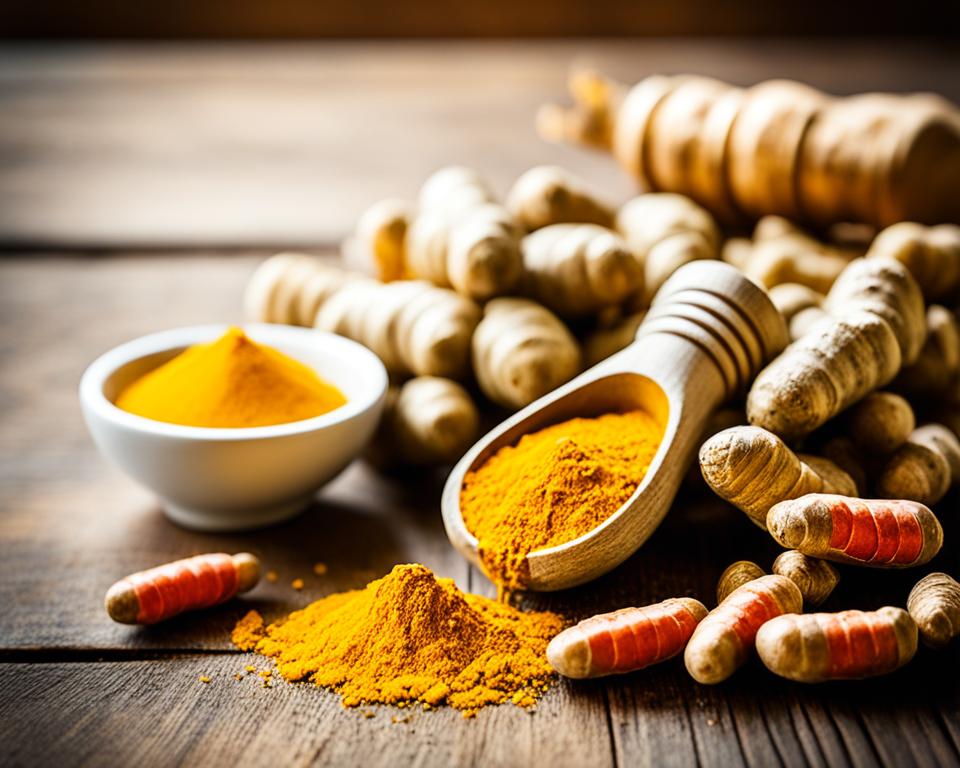
| Potential Benefits | Potential Considerations |
|---|---|
| Anti-inflammatory properties | Interactions with medications |
| Antioxidant protection | Potential side effects |
| Digestive support | Quality and dosage concerns |
Growing and Sourcing Fresh Turmeric
If you’re interested in trying fresh, raw turmeric, you can grow it at home or buy it from local markets or specialty stores. Turmeric is like ginger and grows well in warm places. It tastes even better fresh than dried.
Cultivating Turmeric at Home
Growing turmeric at home is rewarding. Plant it in soil that drains well and gets lots of sun. With care, you’ll get fresh, fragrant turmeric for your cooking.
Sourcing from Local Producers
If you don’t want to grow your own turmeric, buying from local farmers or specialty stores is a great choice. You’ll get the freshest, tastiest turmeric this way. It lets you enjoy its strong smell and flavor. Plus, you can learn more about how it’s grown and found.
| Benefit | Fresh Turmeric | Dried, Ground Turmeric |
|---|---|---|
| Flavor Intensity | Highly Concentrated | Milder |
| Aroma | Vibrant and Pungent | Less Pronounced |
| Culinary Applications | Versatile in Dishes | Commonly Used in Powdered Form |
| Shelf Life | Shorter (1-2 Weeks) | Longer (6-12 Months) |
Choosing to get fresh turmeric can really change your cooking. It adds a unique taste and bright color to many dishes.
“Fresh turmeric is a game-changer in the kitchen, unlocking a whole new world of flavor and culinary possibilities.”
Turmeric in Ayurvedic Medicine
Turmeric has been a key ingredient in Ayurveda for centuries. This spice is known for its anti-inflammatory and antioxidant effects. It also helps with digestion and breathing.
Ancient Wisdom
Ayurvedic texts from thousands of years ago praise turmeric. They see it as a versatile and valuable herb. Turmeric balances the three main life forces, or doshas, in the body.
- Turmeric is used in Ayurvedic medicine to boost health and aid healing.
- It’s often given for arthritis, muscle pain, and stomach issues because of its anti-inflammatory effects.
- The antioxidants in turmeric, especially curcumin, help fight harmful free radicals and keep cells healthy.
Turmeric’s popularity in Ayurvedic medicine has led to ongoing research on its health benefits.
“Turmeric has long been revered in Ayurvedic medicine as a versatile and valuable herb with a wide range of therapeutic properties.”
Combining Turmeric with Other Spices
Turmeric is a versatile spice that shines when paired with other flavors. It can be enjoyed alone, but mixing it with spices opens up new tastes and health benefits.
One famous mix is turmeric with black pepper. This combo boosts the taste and makes turmeric easier for the body to use. Adding a bit of black pepper helps your body get the most out of turmeric’s benefits.
Turmeric also goes well with many spices, herbs, and foods. For example, ginger, cinnamon, and cardamom blend well with it. Together, they create warm, aromatic flavors that delight the senses.
| Spice Combination | Culinary Uses | Health Benefits |
|---|---|---|
| Turmeric and Black Pepper | Curries, stews, marinades | Improved curcumin absorption, anti-inflammatory properties |
| Turmeric and Ginger | Teas, smoothies, stir-fries | Digestive support, anti-inflammatory benefits |
| Turmeric and Cinnamon | Baked goods, oatmeal, chai | Antioxidant protection, blood sugar regulation |
Exploring turmeric with other spices can lead to new flavors and health perks. Try different mixes to find what you like best.
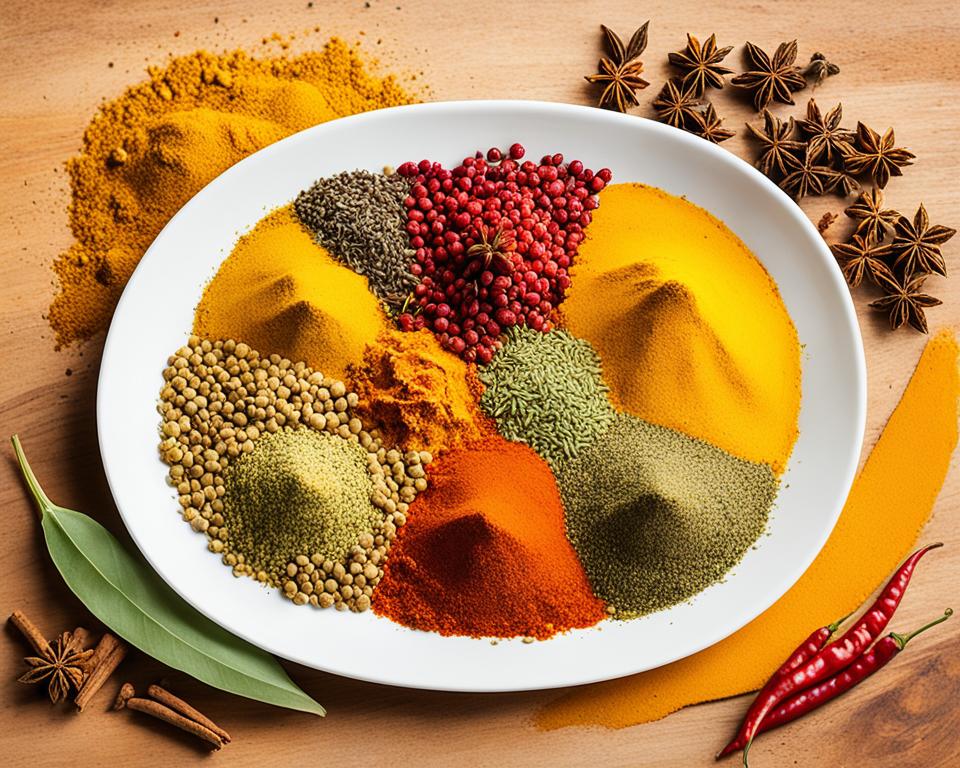
Precautions and Side Effects
Turmeric is usually safe for most people when eaten in normal amounts. But, it’s good to know about possible side effects and precautions, especially with supplements. Some folks might get upset stomach, allergic reactions, or have issues with certain medicines. Always talk to a healthcare expert before starting turmeric supplements.
One common side effect of turmeric is stomach trouble like nausea, diarrhea, or belly pain. This happens because turmeric has a lot of curcumin, which can bother the stomach for some. People with gallbladder problems or those on blood thinners should be careful with turmeric supplements.
Some people might have allergic reactions to turmeric, showing up as skin rashes, hives, or trouble breathing. If you’re allergic to ginger family plants, like turmeric, don’t eat a lot of it or take supplements without a doctor’s advice.
- Digestive discomfort (nausea, diarrhea, abdominal pain)
- Allergic reactions (skin rashes, hives, difficulty breathing)
- Interaction with certain medications (blood thinners, gallbladder issues)
To use turmeric safely, always follow the suggested dosages, especially with supplements. Be aware of any sensitivities or health issues you have. This way, you can enjoy turmeric’s benefits without worrying about side effects and precautions.
Conclusion
Turmeric has caught the eye of health lovers, food creators, and natural medicine experts. It’s known for its strong anti-inflammatory effects, bright color, and great taste. This spice has changed the game in nutrition, wellness, and cooking.
Studies keep showing how good turmeric is for us. It’s becoming a key part of a healthy life. You can use it in tasty meals, in drinks, or for health reasons. Its uses are endless.
In wrapping up our look at turmeric, we see it’s a treasure for health, food, and wellness. By using turmeric, we can improve our health, try new foods, and value nature’s gifts even more.





